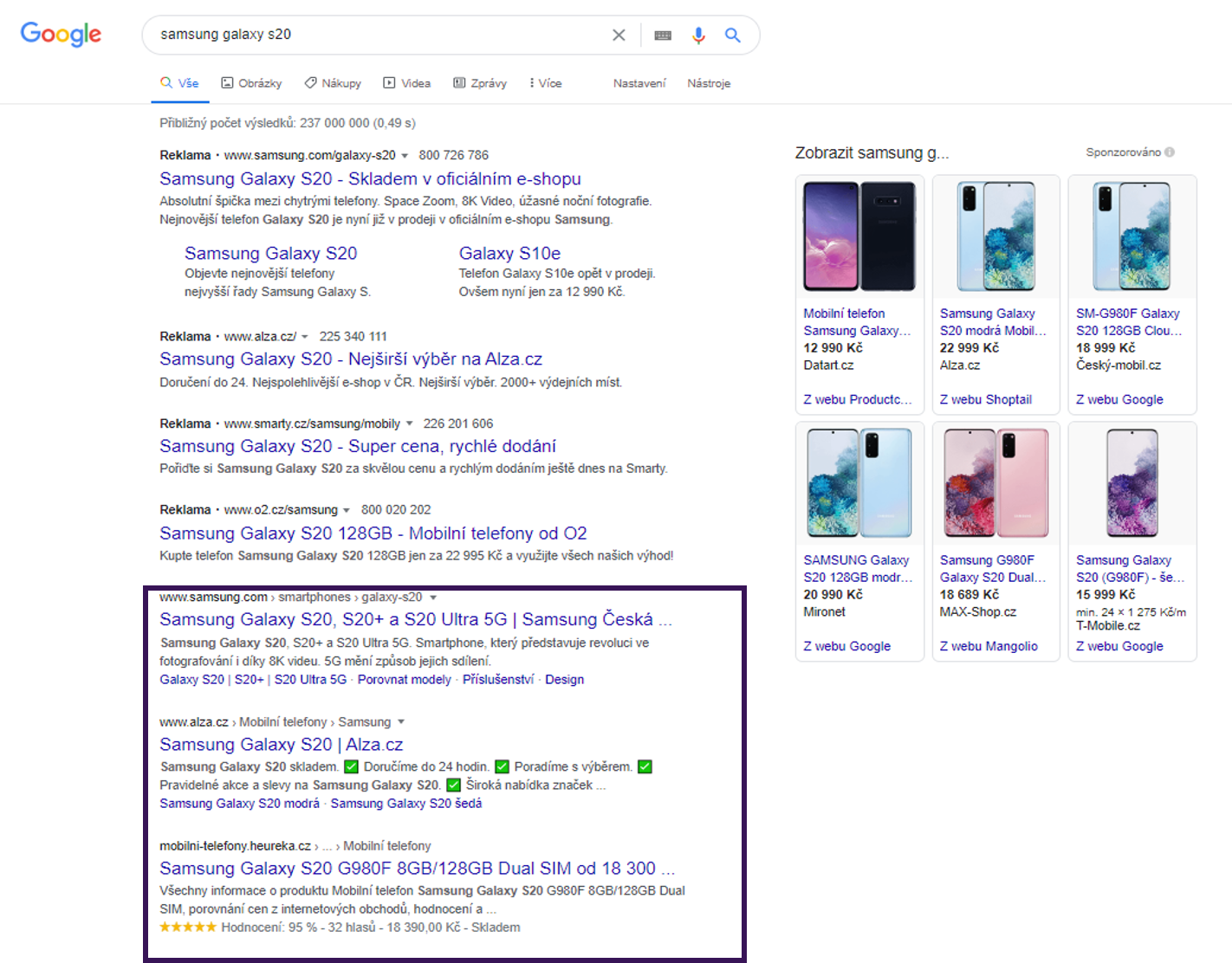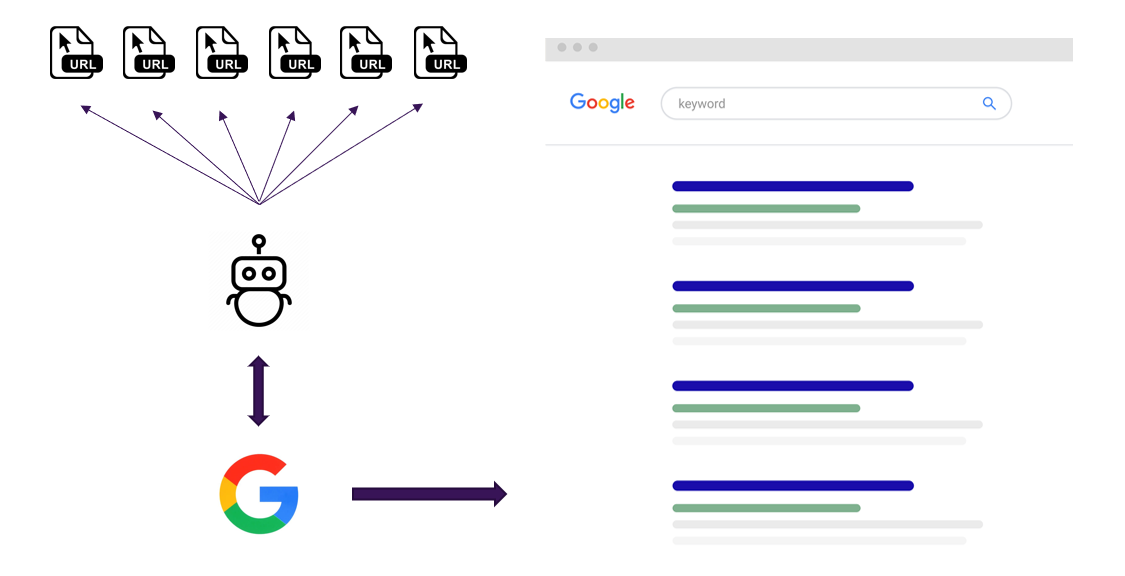Search engine optimization sounds like the name of some intricate spell, but in reality it’s not rocket science. If you understand how search engines think, you’re already halfway there. Furthermore, this is a job for both creative and analytical minds.
What is SEO?
SEO stands for search engine optimization. It is a set of different methods, the goal of which is to bring as many relevant visitors as possible to your website from an organic search. In other words, you try to make sure that your web has the best possible position in non-advertised search.
For example, look at the results for “samsung galaxy s 20”. The first four links are paid ads (my regards to my PPC colleagues), and only then can you see the organic results. These are what we focus on.
The search engine results page (SERP).
Why SEO is important
The first-page results displayed by search engines are considered a relevant and trustworthy source of information for the given search words. SEO then helps us ensure we build up to reach this position. I use the world “build”, as this takes a lot of time and effort. It requires a long-term strategy, the results of which are visible in months at the earliest. As they say, good things come to those who wait.
5 reasons why you should pay attention to SEO
1. Organic searches are usually the biggest source of visitors
Most website visitors come from these search results. Web traffic can be supported temporarily by a PPC campaign, but usually you can’t do that forever. You gradually build your organic visit rate so as not to depend on advertisements.
2. Build the trustworthiness and authority of your brand
Artificial intelligence used in search engines assesses, for example, the link profile of the website (number and quality of backlinks to your website) or content optimization, and can even verify the correctness of information on the website. If your website claims that Microsoft was founded by Steve Jobs, you could optimize your keywords with all your might and still would never reach the first positions on the results page.
3. Good SEO means a better user experience
Search engines evaluate not only the content but also the technical aspects of the website. They know if a website takes a long time to load on a phone or if the users tend to leave it immediately. The aim is to provide users with a website that are easy to navigate and contains the information they are looking for.
4. Satisfy your clients’ needs
SEO uses the term “search intent”. Search engines try to understand what the user is looking for and offers them the appropriate results. People who search for “how to tie a tie” will be shown video instructions, not e-shops. When searching for “pizza žižkov” they won’t get recipes for pizza but a map with pizzerias in Žižkov, including reviews. This is why it’s important for your content to meet the intent of the clients.
5. SEO is measurable
You might not have the same simple metrics that you do for PPC campaigns such as ROI, but with properly set goals you can monitor almost anything. It is important to be able to connect all the pieces together and determine the links between them. The most commonly monitored metrics include the development of organic traffic over time, bounce rate, position of the web in an organic search and the number of indexed webpages.
How does searching work?
The search engine is sort of like a library. It collects information, creates a catalogue and upon request provides relevant information on the given topic. It regularly sends its robots (also called bots or crawlers) to go through websites and collect information about their content. Information about websites is stored (indexed) to gradually build a knowledge base (index). When you enter the search words, the search engine tries to find the most relevant answer in its index using an algorithm.
 The search engine uses many factors to assess a website’s relevance, the list and description of which are a topic for a whole another article. SEO factors are divided into on-page and off-page.
The search engine uses many factors to assess a website’s relevance, the list and description of which are a topic for a whole another article. SEO factors are divided into on-page and off-page.
On-page factors include everything that the web author can directly affect. Examples includes the content, its quality, processing, the use of keywords and most frequently searched phrases. The speed of the web is also important, as well as the url address structure and navigation, optimization for mobile searches and accessibility for robots.
Off-page factors then include elements that you cannot fully control and are affected by the visitors and other websites. Typically these include the number and quality of backlinks or shares of the content by users on social media.
For what websites does SEO make sense?
For every single one, no doubt about that. However, each website requires a different approach. E-shops or comparators of goods must take into consideration the technical side of SEO and regularly check the indexation and proper function of filtering. For example, they use the option to include the price of products, its availability and rating in the search results. A news portal, on the other hand, will act differently, as it depends on the accessibility and speed of the web on mobile devices. And for a cooking blog, for example, an attractive design is crucial.
I personally enjoy how interdisciplinary SEO is. When working in the content, I draw on my copywriting experience, while in technical SEO I use my knowledge of HTML and basic understanding of Javascript. Thanks to SEO I gradually expand my knowledge of UX, psychology, programming and business analysis. In the next article I will introduce the 10 most important SEO factors, and I’m already looking forward to seeing you on some of our future training sessions.
